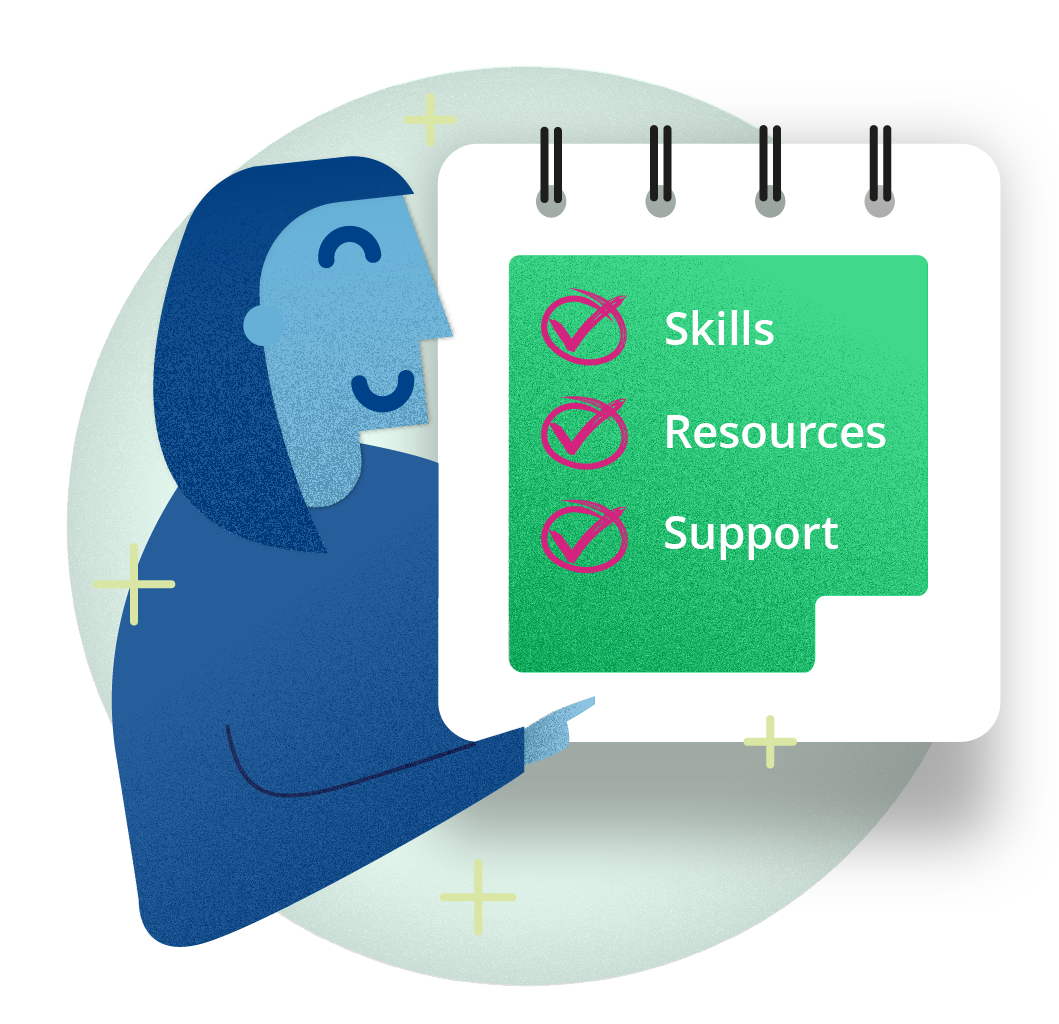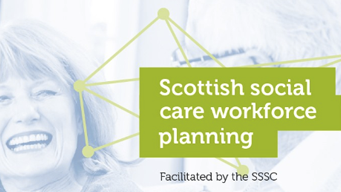

It is ongoing and dynamic, considers strategic factors and is aligned to strategic planning to inform decision making, risk assessment and resource allocation.
The SSSC Workforce Planning Team supports employers, commissioners and policy makers to deliver a sustainable, integrated and innovative workforce. You can contact us at workforceplanning@sssc.uk.com
We contribute to the National Workforce Strategy for Health and Social Care in Scotland. See below how our work aligns to the five pillars of the workforce journey: plan, attract, employ, train and nurture.
Read more about the Strategy here
We are an official statistics provider and publish data on the social service workforce in Scotland. Our Scottish Social Services Council Data website has a wide range of tools, visualisations and datasets to help you to use the data to plan your workforce for the future.
The Workforce Skills Report 2021 looks at the current provision of qualifications for the social work, social care and early years workforce, demand for qualifications and how they meet current skills needs. It also looks at barriers to undertaking qualifications and what new skills are needed for the future.
Networking with others across the social care sector is an effective way to keep up to date with current and future developments in our sector. To help you do this we have formed a Scottish Social Care Workforce Planning Network in partnership with COSLA, Scottish Care and CCPS.
Our Your Career in Social Services website and Careers Toolkit can support employers, careers advisors, teachers, parents and employment support workers.
Right Values, Right People: Recruitment Toolkit provides resources to help employers use and embed values-based approaches to recruitment and retaining workers.
Safer Recruitment Through Better Recruitment is good practice guidance to help employers, especially those in social care, early education and childcare and social work to meet existing legislative and regulatory requirements.
We work with the College Development Network (CDN) to promote the course Introduction to a Career in Social Care, a six-week, part time online course that introduces individuals who may have an interest in a career in social care, but wish to know more before committing themselves. We also have an online tool on MySSSC that links employers with colleges and students.
Have you considered recruiting from outside of the UK or recruiting from the displaced talent pool of refugees and asylum seekers within the UK? Recent changes to Home Office rules have made this a more realistic proposition, although we recognize it can still be a daunting process. Read Recruitment of Refugees and Asylum Seekers and Workers from outside the UK for simple guidance and links to more detailed information.


We have a duty under the Equality Act 2010 to assess the impact of any new or revised policies. An Equality Impact Assessment (EIA) helps us to make sure our policies, and the way we carry them out, do what they are intended to do for everyone.
We contribute extensively to national priorities around promoting social care as a rewarding career. We have developed career pathways and explored enhanced roles, for example health and social care workers who could provide a wider range of services. The pay, terms and conditions of the social service workforce are outwith our remit although we play a key part in reinforcing the criticality of the sector.
We work to promote the professionalisation of careers in the care sector through the continued registration of the workforce and the development of social service qualifications that reflect the skilled nature of the duties care workers carry out.
We are committed to the principle of Effective Voice making sure new tools, guidance and policies are developed for and with the people who are impacted by them and reflect their own experiences, expectations and needs. We actively contribute to the development and implementation of effective voice standards that all employers will be asked to implement to improve the way they listen to and act on employee feedback.
The National Induction Framework can complement your organisation’s induction programmes and relevant policies and procedures. It will support you and your workers to identify what knowledge and guidance they need to be equipped and confident to safely provide person centred support to people in their new role.
Continuous Professional Leaning (CPL) is the learning we do for work which helps us develop our knowledge, skills and professional behaviour so we can deliver our best practice. All registered workers must undertake relevant learning to maintain and improve their knowledge and skills and contribute to the learning and development of others. You can read the CPL guidance here.
Leadership development can be used to underpin and support improvement activity for the entire workforce. The Continuous Learning Framework illustrates how workers and organisations can develop their knowledge, skills and values.
Our Learning Zone has a wide selection of free apps and resources for workers, supervisors and managers to help develop knowledge and skills. There you can also find frameworks, standards, guides and other resources to help all types and sizes of organisations with recruitment, training and continuous development.
We work in partnership with other organisations to develop guides for Infection Prevention and Control Resources, in particular COVID-19 guides.
The Promoting Excellence framework sets out the knowledge and skills needed for new ways of working for all health and social care staff to support people with dementia, their families and carers to maximise their rights, choices and health and wellbeing at all stages of their own dementia journey.
For more information and advice see Information and advice for Dementia Ambassadors.


Organisations from across Scotland, including the SSSC, worked together to create the National Wellbeing Hub to help health and social care workers and carers look after their physical and mental health. Specifically tailored to support the challenges faced during COVID-19, the hub provides comprehensive advice on self-care and personal resilience to help you recognise warning signs. There’s also information about services and resources available at national and local level within NHS boards, Health and Social Care Partnerships (HSCPs) and local authorities.
We contribute extensively to national priorities around promoting social care as a rewarding career. We recognize the positive impact on retention of having well-developed career pathways and the benefits of exploring enhanced roles, for example health and social care workers who could provide a wider range of services.
We are committed to the principle of Effective Voice, making sure new tools, guidance and policies are developed for and with the people who are impacted by them and reflect their own experiences, expectations and needs. We actively support and participate in the Fair Work in Social Care Group developing standards that all employers will be asked to implement to improve the way they listen to, and act on employee feedback.

If you have a role, responsibility or interest in workforce issues in Scotland’s social care sector you may be interested in joining the Scottish Social Care Workforce Planning Network community of interest.

This resource will compliment your organisation's induction programme, policies and procedures.

Start your life changing career in social services by exploring our careers website.